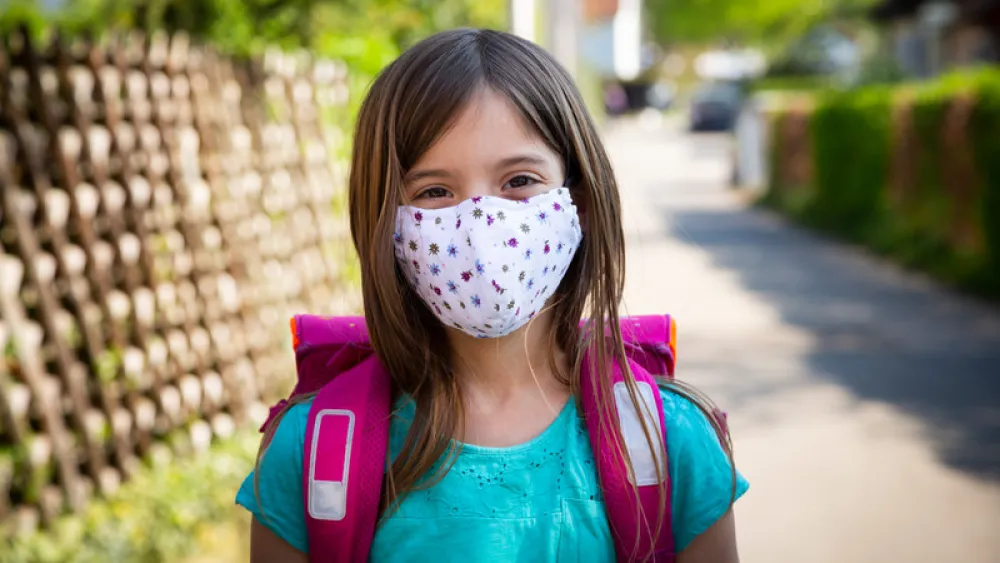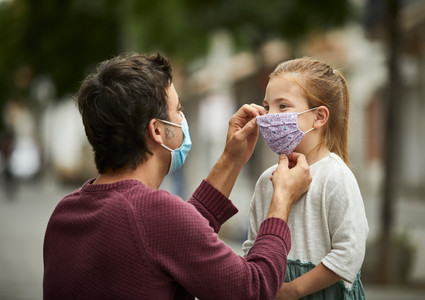Family Health
Back to School During COVID-19: The Uncharted Territory and Roles We All Play
Published: July 30, 2020

It’s back-to-school time, but this year’s return to the classroom will be unlike any we’ve experienced. As COVID-19 concerns continue, some schools are adjusting to make in-person instruction as safe as possible. Others are planning hybrid models with remote and in-person learning, and some have opted to begin the school year with fully remote instruction.
That leaves parents and families with plenty of questions and concerns. The return to school is always a stressful time of year, but this is uncharted territory.
Regardless of what the school year looks like for your kids, we can all agree on the importance of education. And there are steps we can all take to lower the risk of COVID-19 spread in the community – which is key to allowing schools to succeed.
The Importance of In-Person Learning
With all the information – and misinformation – about COVID-19 that’s out there, heading back to school can seem daunting.
The evidence is clear, though, that children thrive when they physically attend school. In addition to getting academic instruction, attending school in-person can:
- Help develop social and emotional skills
- Promote cognitive growth
- Ensure student safety
- Provide adequate nutrition
- Offer opportunities for physical activity
- Provide physical, speech and mental health therapies
- Address racial and social inequality
And there are intangibles. Perhaps you noticed that your kids just didn’t seem like themselves when school shut down this spring. Children benefit mentally from the routine, opportunities and socialization that school offers.
Remote learning may be necessary at times, but it simply can’t provide the numerous benefits of an in-person learning environment. The challenge this school year is having children present in the safest environment possible.
How to Protect Yourself and Others From COVID-19
The advice for everyone, including families sending kids to school this fall, is unchanged. But a reminder never hurts.
Monitor your health daily. Take your child’s temperature. Do they have any symptoms of COVID-19? Even if it seems like just a case of the sniffles, keep them home and consult your doctor.
Stay home if you’re sick. It bears repeating. If you or your children are sick, the best thing you can do to protect others is stay home.
Practice social distancing. Schools are working on plans to put more distance between students, but the responsibility is on all of us. Students and staff members should try to keep 6 feet of distance between themselves and others whenever possible.
Keep your hands clean. Wash your hands frequently with soap and water. Use hand sanitizer if soap and water aren’t available. Don’t touch your face with unwashed hands.
Wear a mask. Whether your school requires it or not, the science is clear that properly wearing a face mask can help prevent the spread of COVID-19.
Maybe you know these core COVID-19 prevention techniques inside and out. But what about your kids? If you haven’t already, the time to educate them is now.
 Kids and Masks
Kids and Masks
We know how important masking is right now, but many parents understandably are worried about how their kids will adjust to wearing a face covering. Engaging children now can help to keep them healthy and motivated to stay vigilant throughout the school year. These tips can help:
Set an example. If your children see you wearing a mask, they’re likely to be comfortable following your lead.
Talk about it. Emphasize why this behavior is important and how it can keep family, teachers, classmates and others safe. Address their questions and worries. Explain how this simple action can help keep them in school and doing the things they enjoy.
Get them involved. Let children pick out mask designs and colors for themselves. Write their name inside of their masks, and let them choose a special tie or lanyard to keep track of their mask during meals or mask breaks.
Make it a habit. Going to the store or running an errand? Wear a mask. Make the act of donning a mask run-of-the-mill now so it’s an easier adjustment once school begins.
Remote Learning and Homeschooling
While the benefits of in-person education are clear, it may not be the right decision for every family. Some children have health issues. Some families have high-risk people living at home. Some parents are simply anxious, nervous or unsure about how safe returning to the classroom is.
Fortunately, most school districts are making plans to offer partial or full remote education. And many families are considering their homeschooling options. The best plan will vary from family to family, but remember that your primary care team can help you make the decision that’s right for you.
If you choose to homeschool your children or participate in remote learning, it’s important to maintain a consistent routine. Parents and students need to understand – especially if this is their first year with such an arrangement – that the school they attend at home is just as important and serious as the school they attended in person. Reach out to your school district and other parents to share strategies to make sure children are keeping pace with their peers.
Are Extracurricular Activities Safe?
While extracurricular activities are important for children’s physical and social development, their very nature currently presents an additional health risk. Like so many things with the return to school, there is no one-size-fits-all answer when it comes to sports, music lessons, scouting and other children’s activities. Any activity that can be done outdoors and/or with face coverings will present a lower risk, but it may not eliminate it. Consider your family’s situation, and consult your pediatrician if you have questions.
We’re All in This Together
This is an emotional, uncertain and stressful time. Schools are doing their best to offer options that keep students and staff safe while providing the best education possible. Parents are juggling work schedules and child care arrangements, among other things. Everyone is feeling it.
There will undoubtedly be trying times ahead, and the best-laid plans are bound to change. Patience is key to a successful school year. By working together, we can help make sure our children are learning in healthy, safe environments.
More Resources
- Read more from the American Academy of Pediatrics about returning to school during COVID-19
- Learn more about the importance of well-child checks
- Find a Methodist Physicians Clinic pediatrician


